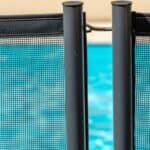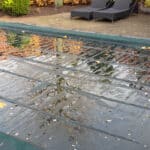A pool is only fun if it’s clean, and nobody likes to spend hours scooping out debris and tinkering with water chemistry. A little bit of maintenance can do a lot of heavy lifting when it comes to reducing costs and giving you more hours of enjoyment.
Here are 7 easy maintenance tasks Long Island pool owners can do to keep their pools in top shape:
1. Empty your pool’s skimmer basket.
The skimmer, much like its name implies, skims the surface of the water to catch debris before it can soak up enough water to sink to the bottom.
Pools on Long Island can be magnets for leaves, maple seeds, acorns, and bird feathers otherwise. If your skimmer is effective, it’s going to fill up quickly.
A full skimmer doesn’t work as well as an empty one, so be sure to regularly empty your skimmer basket to keep it running efficiently.
It might sound a bit weird, but you can actually make your skimmer more effective with an old pair of stockings. Stretch a pair of nylon pantyhose over the basket to catch fine particles.
If bugs keep ending up in your skimmer basket, banish them by landscaping with plants bugs hate — citronella, lemongrass, peppermint, and marigold are all proven bug-banishers, no pesticide needed.
2. Keep an eye on your pool’s water level.
Pools can be surprisingly finicky when it comes to their water level.
If it’s too high, your skimmer won’t be able to work properly and you’ll end up with slimy, soggy debris at the bottom of your pool. Too low, and your pump might run dry, overheat, and break down.
Check your water level and fill or drain as needed to keep it in the sweet spot.
3. Check your pool’s chlorine levels.
Chlorine helps keeps things clean, but it’s possible to have too much of a good thing.
Too little chlorine and you could end up with all kinds of nasty microorganisms in your water. Too much, and the excess chlorine can fry your hair and burn your skin.
Test your pool’s chemistry once or twice a week and take a look at your chlorinators when you do. If you have an inline or deck chlorinator, check it for clogs and make sure it has chlorine tablets.
If you have a salt pool chlorine generator, make sure the salt cell doesn’t have calcium deposits or other scale that might keep it from working effectively.
4. Clean your pool’s filter.
This only needs to be done a few times per year, so it’s easy to forget.
If the pool’s drain looks clogged, the water smells off, or your hose cleaner is operating slowly, it’s time to give the filter a solid go-over.
It’s also a good idea to check things out after a heavy storm since high winds and rain can carry all kinds of things into your water.
Long Island doesn’t get a lot of storms, but they can still wreak havoc on your pool’s cleanliness and water chemistry if you aren’t on top of things.
5. Float a tennis ball in your pool.
If all Long Island pools had to contend with was the occasional leaf, stick, or hair, they’d be a lot easier to keep clean.
Unfortunately, hair care products, lotion, sunscreen, perfume, and other substances end up dissolved in the water, which can make it cloudy and leave an oily film on the top. Since this oil is a liquid, skimmers aren’t much help — not even with pantyhose.
Instead, throw a tennis ball in your water. Tennis balls float, which keeps them at the surface where this oil collects, and their fuzzy exteriors help them absorb anything that doesn’t belong in your water.
6. Vacuum your pool.
It’s a good idea to vacuum your pool about once a week. Even if you have a robotic pool cleaner, a vacuum can get rid of the heavy stuff that a light robot can’t handle.
Long Island has a pretty mild, temperate climate, but that means a lot of rain in spring and leaves through spring, summer, and fall.
A vacuum quickly and efficiently removes leaves and other organic debris that contribute to algae growth and throw off your pool’s chemistry.
It does require some specialized equipment and a fair amount of time, however, so you might want to leave this task to professionals.
7. Know when to call the pros.
Pools are fun, but not if you spend more time cleaning and maintaining them than you do swimming in them.
If any regular maintenance tasks are too much to handle (or if putting off maintenance has left you with a serious situation on your hands), call in a professional. They can clean, test, and adjust as necessary, with no stress or effort on your part.
Before you get ready to open up your pool for Long Island’s swimming season, be sure to plan out how you’ll keep everything clean and maintained.
A little regular maintenance every week or so can save you a lot of time and money in the long run, even if you end up calling a professional.
Clean and check your pool for a few minutes once or twice a week, and you’ll get plenty of relaxing afternoons by the pool in return.



